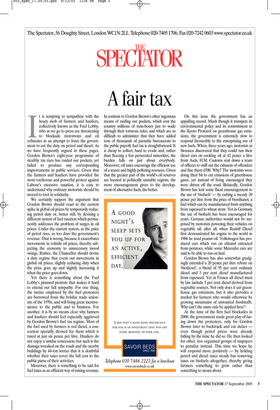A fair tax
It is tempting to sympathise with the hoary mob of farmers and hauliers, collectively known as the Fuel Lobby, who as we go to press are threatening to blockade motorways and oil refineries in an attempt to force the government to cut the duty on petrol and diesel. As we have frequently argued in these pages, Gordon Brown’s eight-year programme of stealthy tax rises has raided our pockets, yet failed to produce any corresponding improvements in public services. Given that the farmers and hauliers have provided the most vociferous and powerful protest against Labour’s excessive taxation, it is easy to understand why ordinary motorists should be moved to toot in solidarity.
We certainly support the argument that Gordon Brown should react to the current spike in global oil prices by temporarily reducing petrol duty or, better still, by devising a different system of fuel taxation which permanently addresses the problem of surges in oil prices. Under the current system, as the price of petrol rises, so too does the government’s revenue. That is wrong, because it exacerbates movements in volatile oil prices, thereby subjecting the economy to unnecessary mood swings. Rather, the Chancellor should devise a duty regime that evens out movements in global oil prices, slightly reducing duty when the price goes up and slightly increasing it when the price goes down.
Yet there is something about the Fuel Lobby’s planned protests that makes it hard to extend our full sympathy. For one thing, the tactics employed by the fuel protesters are borrowed from the bolshie trade unionists of the 1970s, and will bring great inconvenience to the public and to business. For another, it is by no means clear why farmers and hauliers should feel especially aggrieved by Gordon Brown’s fuel tax regime. Most of the fuel used by farmers is red diesel, a concoction specially devised for them which is taxed at just six pence per litre. Hauliers do not enjoy a similar concession, but such is the damage wreaked on the roads and the nearby buildings by 44-ton lorries that it is doubtful whether their taxes cover the full cost to the public purse of their activities.
Moreover, there is something to be said for fuel taxes as an efficient way of raising revenue. In contrast to Gordon Brown’s other ingenious means of raiding our pockets, which cost the country millions of man-hours just to wade through their tortuous rules, and which are so difficult to administer that they have added tens of thousands of parasitic bureaucrats to the public payroll, fuel tax is straightforward. It is cheap to collect, hard to evade and, rather than fleecing a few persecuted minorities, the burden falls on just about everybody. Moreover, oil taxes encourage the efficient use of a scarce and highly polluting resource. Given that the greater part of the world’s oil reserves are located in politically unstable regions, the more encouragement given to the development of alternative fuels, the better. On this issue the government has an appalling record. Much though it trumpets its environmental policy and its commitment to the Kyoto Protocol on greenhouse gas emissions, the government is extremely slow to respond favourably to the enterprising use of new fuels. When, three years ago, motorists in Swansea discovered that they could run their diesel cars on cooking oil at 42 pence a litre from Asda, H.M. Customs sent down a team of officers to sniff out the exhausts of offenders and fine them £500. Why? The motorists were doing their bit to cut emissions of greenhouse gases, yet instead of being encouraged they were driven off the road. Belatedly, Gordon Brown has lent some fiscal encouragement to the use of ‘biofuels’ — by cutting a measly 20 pence per litre from the price of bioethanol, a fuel which can be manufactured from anything from rapeseed to wheat straw. Yet in Germany the use of biofuels has been encouraged for years. German authorities would not be surprised by motorists powering their vehicles on vegetable oil: after all, when Rudolf Diesel first demonstrated his engine to the world in 1906 he used peanut oil. Volkswagen has produced cars which run on ethanol extracted from potatoes, while some Mercedes cars are said to be able to run on lard.
Gordon Brown has also somewhat grudgingly extended a 20 pence per litre rebate on ‘biodiesel’, a blend of 95 per cent ordinary diesel and 5 per cent diesel manufactured from rapeseed. Yet in France all diesel must by law include 5 per cent diesel derived from vegetable sources. Not only does it cut greenhouse gas emissions, but it also provides a market for farmers who would otherwise be growing mountains of unwanted foodstuffs. Why can’t the same rule be applied here?
At the time of the first fuel blockades in 2000, the government made great play of facing down the protesters, only for Gordon Brown later to backtrack and cut duties even though petrol prices were already falling by the time he did so. He then looked for other, less organised groups of taxpayers to penalise instead. This time we hope he will respond more positively — by holding petrol and diesel taxes steady but removing taxes on biofuels altogether, thereby giving farmers something to grow rather than something to moan about.



















































 Previous page
Previous page